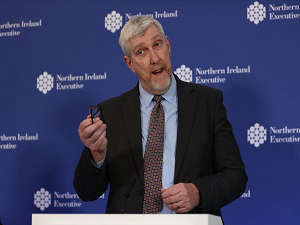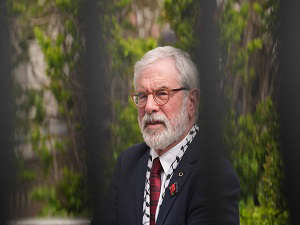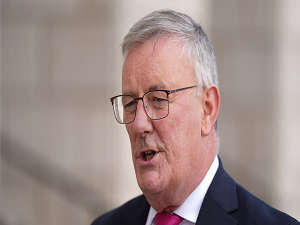
By Jonathan McCambridge and Rebecca Black (PA)
The Stormont Executive has agreed its budget for 2025/26, with increased investment pledged to tackle hospital waiting lists and support parents with the cost of childcare.
Finance Minister John O’Dowd said it showed the Executive was “prepared to do things differently”.
He also said he intended it to be the last single-year budget agreed by ministers before it moves towards multi-year spending plans.
The budget for Stormont departments was agreed unanimously following a meeting of the four-party powersharing Executive.
Mr O’Dowd said the budget included £16 billion of investment in public services plus £2 billion in capital spending.
He said: “Today sets out a direction of travel which shows this Executive is prepared to do things differently and use our limited resources to do what matters most.
“While the financial position in 2025-26 remains challenging for all departments, the budget agreed by the Executive today clearly prioritises its programme for government priorities and, excluding earmarked allocations and in-year transfers, provides every department with an uplift on its 2024-25 final budget position.”
The budget will include increased investment for work to cut waiting lists, for special educational needs and into skills for growing the economy, the minister said.
Mr O’Dowd said: “This Budget will mean £215 million going towards cutting health waiting lists and supporting investment in elective care.
“It doubles our investment in the early years and childcare strategy to £50 million – supporting our children and helping hard-working families.
“It provides £15 million in additional funding for special educational needs.
“It delivers £15 million to build the skills needed both now and in the future to grow our economy.
“It provides an additional £5 million to make our communities safer and £2 million towards ending violence against women and girls.
“It recognises the importance of Lough Neagh and our desire to protect it through a £5 million investment.
“It also provides £21.3 million for transformation projects in health, justice, infrastructure and special educational needs.”
In capital spending, the minister said there would be an investment of an additional £105.7 million in wastewater infrastructure and an additional £100 million for social housing.
He said: “There is no doubt that the financial outlook still remains incredibly challenging particularly given the Westminster Government’s continued policy of austerity.
“I will continue to make the case for better funding and to work together with my Executive colleagues to support our workers, families and communities.”
First Minister Michelle O’Neill said it was “really important” that all four parties in the Executive had signed up to the budget.
She said: “It is in the context that we face a dire financial climate, not least because of the decisions that have been taken in London.
“Nonetheless our Executive are united in terms of prioritising public services and investing in public services, and we are all determined to try to deliver as best we can across all of our public services.”
Deputy First Minister Emma Little-Pengelly said the budget agreement showed the Executive was “determined to deliver”.
She added: “We recognise that the fiscal context in which we are making these decisions is very challenging and it will be challenging for each minister.
“But our programme for government provides a roadmap to grow our economy, cut waiting list times and ensure affordable childcare and this supports those priorities.”
Health Minister Mike Nesbitt gave a cautious welcome to the budget but described it as a challenge.
He added that just £50 million would be “new money”.
“It’s come a little bit out of the blue in that we’ve asked for all that money before and been knocked back,” he told reporters at Parliament Buildings.
“I’ve already been speaking to senior officials in the department, it (the money) is in three bits: £85 million which we actually would have been spending anyway, that’s for red flag and life-threatening conditions; we’ve got £80 million for transforming and building up our capacity; and then come June monitoring we’ll actually get £50 million which will be new money.
“It’ll be a cocktail, we’ll do what we can within the health service, we’ll also obviously be going out to the private sector and I’m also keen to bring back the cross-border initiative.”
Mr Nesbitt said the overall budget is challenging because it is “£400 million shy of what we need”.
“The challenge is three-fold: it is to address the waiting lists, which is clearly the will of the Executive and of myself; secondly, to also do the reform piece, because if you only spend money on bringing down the waiting lists, as soon as the money is spent the lists go straight back up again; and then the third is to balance the books,” he said.
“It’s a triple challenge, it’s very, very difficult but I accept that’s the role.”

Finance Minister John O'Dowd speaking to media at Parliament Buildings in Stormont (Photo by PA)


 Gerry Adams awarded 100,000 euro in damages after suing BBC for libel
Gerry Adams awarded 100,000 euro in damages after suing BBC for libel
 Victim held in room while masked men ransack Saintfield home
Victim held in room while masked men ransack Saintfield home
 Nesbitt not surprised if ‘devastating’ culture in RVH report repeated elsewhere
Nesbitt not surprised if ‘devastating’ culture in RVH report repeated elsewhere
 Pensioner, 82, killed in crash near Omagh
Pensioner, 82, killed in crash near Omagh
 Kneecap announce new song ahead of headline performance at London’s Wide Awake
Kneecap announce new song ahead of headline performance at London’s Wide Awake